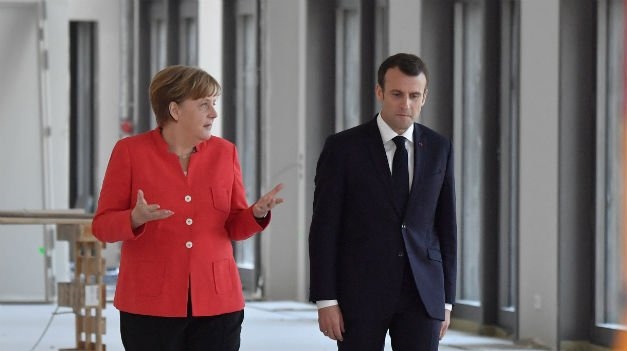A budget for Eurozone?
June 20, 2018 | Expert Insights

French President Emmanuel Macron now has the backing of German Chancellor Angela Merkel for a budget specifically for the Eurozone. The two leaders have noted that this move is a “new page” in the history of the single currency.
Background
The Eurozone (officially called the Euro area) denotes the 19 of the 28 European Union (EU) member states that have adopted the Euro as their common currency. It was established in 1999 and its GDP as of 2016 stood at $11.8 trillion.
The UK was never part of the Eurozone, having retained the Pound as its currency. It had negotiated an opt-out as part of the Maastricht Treaty of 1992. In 2016, the region voted to leave the EU altogether. Britain is currently in the midst of negotiations with EU officials drafting a suitable exit roadmap.
According to data from the Eurostat, the 19 members, part of the Eurozone, saw their growth accelerated by 0.6% in the three months to June 2017. The year-on-year growth has increased to 2.1% as compared to 1.9% from the same quarter last year. This is the best number the region has seen in the past five years. Forecasts have also been bullish regarding the growth of the bloc in the near future. The IMF has said that the Eurozone GDP will grow by 1.7% in 2018.
In addition, the Eurozone has been dealing with the consequences of the Greek debt crisis in the past years. Unable to sustain itself having joined the Eurozone in 2011, Greece’s trade deficit increased, and its unemployment rate rocketed to 25%.
According to statistics released by Eurostat, seasonally adjusted GDP of the Eurozone rose by 0.6% in both the Euro area and in the EU28 during the third quarter of 2017, compared with the previous quarter. In the second quarter of 2017, GDP had grown by 0.7% in both zones. Compared with the same quarter of the previous year, seasonally adjusted GDP rose by 2.5% in both the Euro area and in the EU28 in the third quarter of 2017, after +2.3% and +2.4% respectively, in the previous quarter. This is the highest annual growth rate since the first quarter of 2011.
Analysis
French President Emmanuel Macron won German Chancellor Angela Merkel’s backing for reforms that are aimed at bolstering the eurozone against crises. Merkel, thus, has agreed with Macron’s demands for a collective budget for the bloc.
“We are beginning today a second step in the life of our common currency. Today there is nothing. Tomorrow we will have a budget for the eurozone,” said Macron, after talks with Merkel in the Meseberg castle near Berlin. Merkel added, “We are opening a new chapter in initiatives for the EU and also in Franco-German co-operation.”
Macron has divulged that this budget will have its own governance structure. He added that this would be a “real budget with annual revenues and spending.” The two countries are hoping to have it ready and functional by 2021.
Even though two of the biggest leaders of Europe have agreed for a Eurozone budget, its size remains vague. In addition, other nations who are part of the bloc could still resist in its creation. Macron is yet to reveal how this budget would be funded but noted that this would be discussed with the other members of the bloc. He also did not provide a rough size of how big the budget would be. He said that providing too many details at this present stage would become counter-productive to the initiative and it would be up to all the members to come to a consensus.
“If we are creating a structure like a eurozone budget, expanding the ESM and completing banking union, that’s actually big progress,” Jochen Andritzky, an analyst at the Bruegel think-tank, said.
Assessment
Our assessment is that if the Eurozone budget is approved and created, it would further create a cohesive bloc in Europe. This could change the dynamics of how trade is conducted within Europe and geopolitically across the world. However, given the rise of anti-EU sentiments in nations like Austria, it remains to be seen whether it would become a reality.
Read more - Eurozone to grow 2.4%








Comments